For nearly his entire presidency, Americans have given George W. Bush higher marks for his handling of foreign affairs than for his handling of the economy. By way of comparison, ratings of the elder George Bush showed a similar-- but more pronounced -- division, but ratings of Bill Clinton and Ronald Reagan were generally similar on the two dimensions.
So far in his administration, George W. Bush has averaged a 63% approval rating on foreign affairs, and a 55% approval rating on the economy. This is not surprising given that the economy has been slow throughout Bush's tenure in office, but he has had some visible international successes in the war on terrorism and in Iraq. As the graph below shows, Bush's ratings on the two measures were running about even until the Sept. 11 terrorist attacks. At that time, both ratings spiked, but the spike was larger for Bush's foreign affairs rating than for his economic rating. And since that time, Americans have continued to rate Bush more positively on foreign affairs than on the economy. His most recent approval ratings, taken from a May 5-7 Gallup Poll, are 68% on foreign affairs and 53% on the economy.
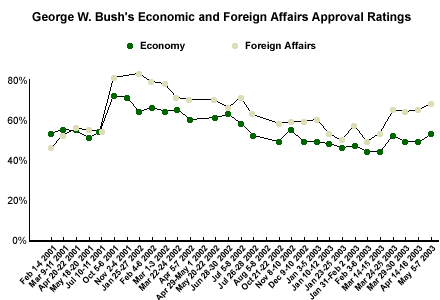
The pattern of ratings for the current president is similar, though not as dramatic, as that for his father, George H. W. Bush. The elder Bush's average foreign affairs approval rating (65%) was 36 percentage points higher than his average economic approval rating. Even prior to the Persian Gulf War and the 1991 economic recession (most of Bush's ratings were taken after these events), the two Bush ratings showed gaps of 10 to 20 points.
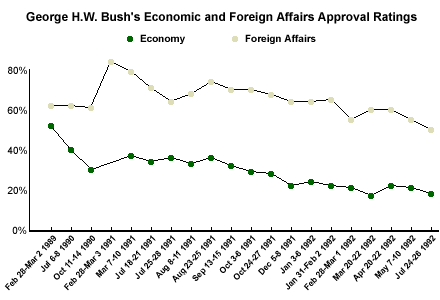
In contrast to the Bushes, two other recent presidents, Reagan and Clinton, show relatively little differentiation between the two ratings. Reagan averaged 46% approval on the economy and 43% on foreign affairs.
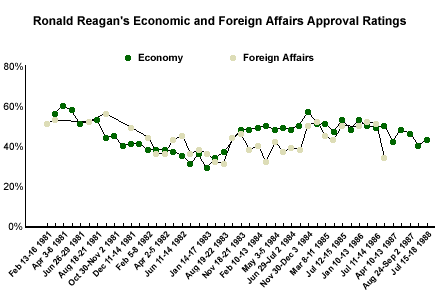
Clinton averaged 52% on the economy and 48% on foreign affairs. Toward the end of his presidency, with the late 1990's economic boom in full force, Clinton received consistently higher marks for his handling of the economy than for his handling of foreign affairs.
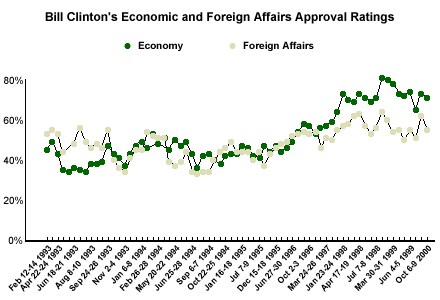
The relatively lower scores for Reagan and Clinton on international matters reflect, in part, the lack of a major foreign event that would lead to dramatic increases in foreign policy ratings similar to those that occurred on the Bushes' watches. Reagan and Clinton did have their share of military successes in places such as Libya, Grenada, and Kosovo, but nothing to compare with the full-scale wars against Iraq or the terrorist attacks on American soil in 2001.
Higher Ratings of Bush Handling of Foreign Affairs a General Phenomenon
Generally speaking, Americans in most demographic subgroups -- including all partisan groups -- give George W. Bush higher marks for his handling of foreign affairs than his handling of the economy. This includes Bush's natural support base of Republicans. According to a May 5-7 Gallup Poll, 94% of Republicans approve of Bush on foreign affairs and 83% approve of Bush on the economy. But the gap between economic and foreign affairs ratings is much larger among Democrats (a 24-percentage-point difference in approval rating) than it is for independents (11 points) and Republicans (11 points). While Republicans are nearly four times as likely as Democrats to approve of Bush on the economy, they are only twice as likely as Democrats to approve of Bush's handling of foreign affairs. Thus, the data clearly show that Democrats are much more likely to give Bush credit for his handling of international issues than for his stewardship of the national economy.
George W. Bush Approval Rating Comparisons by Party, May 5-7, 2003, Gallup Poll
|
Economy |
Foreign Affairs |
|
|
% |
% |
|
|
All Americans |
53 |
68 |
|
Democrats |
22 |
46 |
|
Independents |
49 |
60 |
|
Republicans |
83 |
94 |
While the elder Bush showed substantial gaps in his foreign affairs and economic ratings among all three partisan groups, unlike his son's ratings, these gaps were nearly equal in size. All three partisan groups gave Bush substantially higher approval ratings on foreign affairs (roughly 40 points higher in all three groups) than on the economy. These ratings are taken from an October 1991 poll, in which Bush's scores on the two measures were close to his term averages.
George H.W. Bush Approval Rating Comparisons by Party, Oct. 24-27, 1991, Gallup Poll
|
Economy |
Foreign Affairs |
|
|
% |
% |
|
|
All Americans |
28 |
68 |
|
Democrats |
12 |
53 |
|
Independents |
25 |
70 |
|
Republicans |
48 |
85 |
As a general rule, when Americans give a president similar ratings on both measures, the ratings of partisan groups are nearly identical across the two policy areas. This is evident when looking at typical ratings for Clinton (from a Jan. 6-8, 1994, Gallup Poll) and Reagan (from a May 17-20, 1985, Gallup Poll), and suggests that unless a strong contrast exists between the president's performance in the two areas, the ratings will generally mirror each other and reflect only partisan differences. For example, in Reagan's ratings on the two dimensions, all three partisan groups showed only a slight (three points to four points) difference, but Republicans gave much more positive ratings on both dimensions than did independents, who in turn gave much more positive ratings than Democrats.
Ronald Reagan Approval Rating Comparisons by Party, May 17-20, 1985, Gallup Poll
|
Economy |
Foreign Affairs |
|
|
% |
% |
|
|
All Americans |
46 |
43 |
|
Democrats |
20 |
17 |
|
Independents |
47 |
43 |
|
Republicans |
74 |
71 |
Bill Clinton Approval Rating Comparisons by Party, Jan. 6-8, 1994, Gallup Poll
|
Economy |
Foreign Affairs |
|
|
% |
% |
|
|
All Americans |
49 |
45 |
|
Democrats |
68 |
62 |
|
Independents |
48 |
42 |
|
Republicans |
29 |
27 |
Iraq Success Boosts Bush Ratings in Both Areas
The start of war with Iraq sent George W. Bush's overall approval rating upward from 58% to 71%, and Bush's ratings on both the economy and foreign affairs rose concurrently. While the war significantly improved Bush's foreign affairs rating among Democrats, it apparently did little to help Bush's economic ratings among Democrats. Independents showed a nearly equal boost in ratings across both policy areas, as did Republicans. Republicans showed generally small post-war bounces given their relatively high pre-war ratings.
Bush Approval Comparison Ratings by Party, Pre- and Post-War
|
Economic Approval |
Foreign Affairs Approval |
|||||
|
Pre-War (Mar 14-15) |
Post-War (May 5-7) |
Change |
Pre-War (Mar 14-15) |
Post-War (May 5-7) |
Change |
|
|
% |
% |
% |
% |
|||
|
Democrat |
21 |
22 |
+1 |
27 |
46 |
+19 |
|
Independent |
35 |
49 |
+14 |
43 |
60 |
+17 |
|
Republican |
75 |
83 |
+8 |
87 |
94 |
+7 |
Nearly Half of Americans Give Bush Passing Marks in Both Areas
Forty-nine percent of Americans approve of Bush on both the economy and foreign affairs, while 26% disapprove of Bush in both regards. Twenty percent approve of Bush in one area and disapprove of Bush in the other (which breaks down into 17% approving on foreign affairs and disapproving on the economy, and 3% approving on the economy and disapproving on foreign affairs).
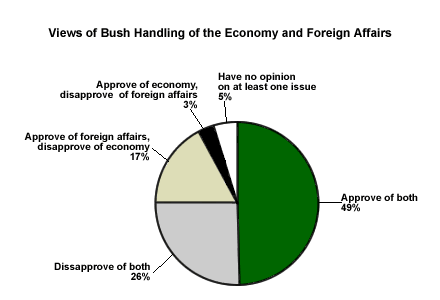
Not surprisingly, the vast majority of Republicans (80%) approve of Bush on both the economy and foreign affairs, while 14% approve on one and 3% disapprove on both. Only 20% of Democrats approve of Bush on both the economy and foreign affairs, while 50% disapprove of Bush on both, and 27% approve on one and disapprove on the other. Among independents, 43% approve of Bush's performance in both areas, 29% disapprove in both, and 21% have mixed opinions.
Bush's latest overall job approval rating, from a May 19-21 CNN/USA Today/Gallup poll stands at 66%, down slightly from his ratings taken after the start of the war with Iraq, which were around 70%.
